For many West African immigrants, neighborhoods like Chatham, South Chicago, and Bronzeville are becoming a home away from the North Side nucleus of the African immigrant community. Five West African immigrant business owners share how food is a bridge to preserve their culture and build new homes on Chicago’s South Side.
Mariam and Ade Lala, owners of Southside African Restaurant
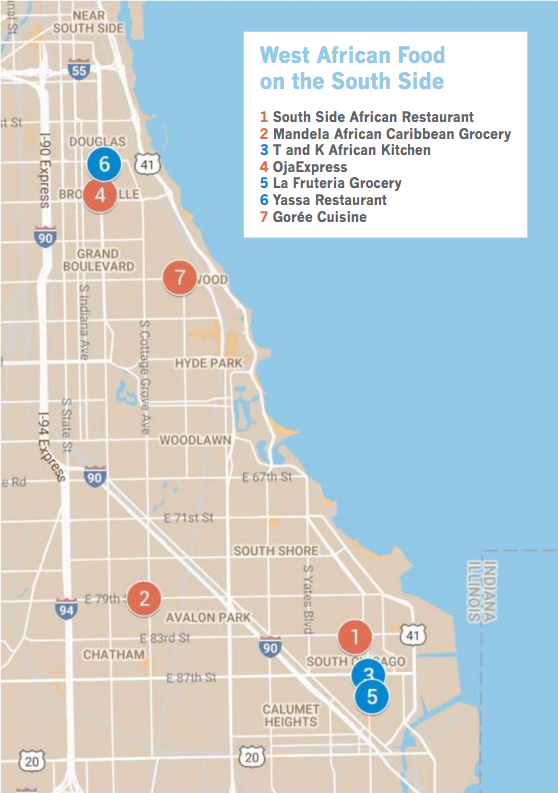
Restaurant owners Mariam and Ade Lala are determined to live the American Dream without sacrificing their Nigerian identity. “I feel American now, I really do, but at the same time at home and in my restaurant, I’m one-hundred percent Nigerian,” explains Mariam as she sits with her husband Ade in a bright orange booth at Southside African Restaurant, with the sounds of ping-pong and customers chatting in Yoruba in the background. “The generosity and love of our culture is something we are trying to bring with us to South Chicago.”
Business isn’t just about selling food they love: they want to build community. “During the summertime, we are all out in the parking lot next to the restaurant grilling, playing Nigerian music and just making people feel comfortable in their own spaces,” explains Ade.
But it wasn’t always that way. “When I was opening this business, I didn’t have a lot of money to start but I wanted to take a chance that the neighborhood would love our food,” Ade said. It seems to be working: now, most customers are locals looking for a taste of the African diaspora on a plate, he said.
Nigerians make up the bulk of catering orders for naming ceremonies and birthdays, and they often visit for grilled suya, a spicy shish kebab, in the adjacent parking lot during the summer. With more and more West African families moving to the South Side, Mariam and Ade feel this growing community needs more unity. “Look at the journey from here to Africa. How can we migrate out here and not be together?” said Mariam.
Southside African Restaurant, 8311 S. Baltimore Ave. Monday-Saturday, 10am-10pm. (872) 666-5588.
Alioune Diagne, owner of Mandela African Caribbean Grocery
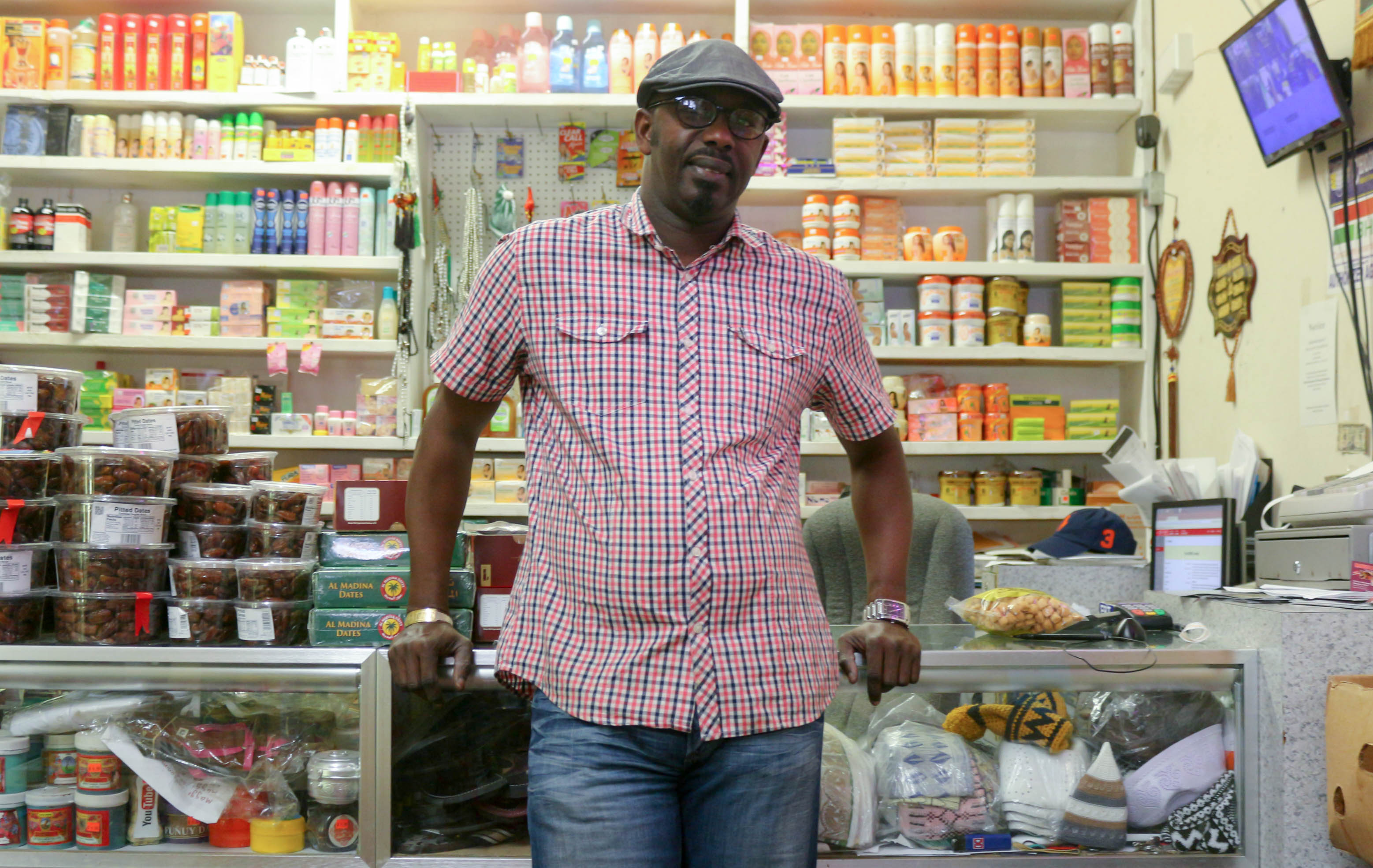
Alioune Diagne is often on the phone bouncing between his native Wolof and French, taking orders for fresh baguettes.
“French bread is very important for West African immigrants because of the influence France had during colonialism. It’s become a regular part of our diet, and for Malians, Senegalese, or Cote d’Ivoirians living on the South Side, my shop provides it fresh,” says Diagne as he hands a large fresh loaf to a Togolese customer at his African grocery on 79th Street.
He says almost all his customers are West Africans living in the area looking for specialty items like Dutch Calvé mayonnaise. “It has this very particular taste that they are missing from home, and at the end of the day I’m in the business of selling items that make people feel like home,” says Diagne. His two-room shop is filled with popular items like dried baobab fruit, tangy gari flour, and dried hibiscus leaves.
Food is a bridge for memories and traditions from West Africa; Diagne says: “You can immigrate to a new country but there are foods that are a part of you.”
Mandela African Caribbean Grocery, 722 E. 79th St. Monday-Saturday, 9am-8:30pm. (773) 723-2111.
Boyede Sobitan, co-founder of OjaExpress
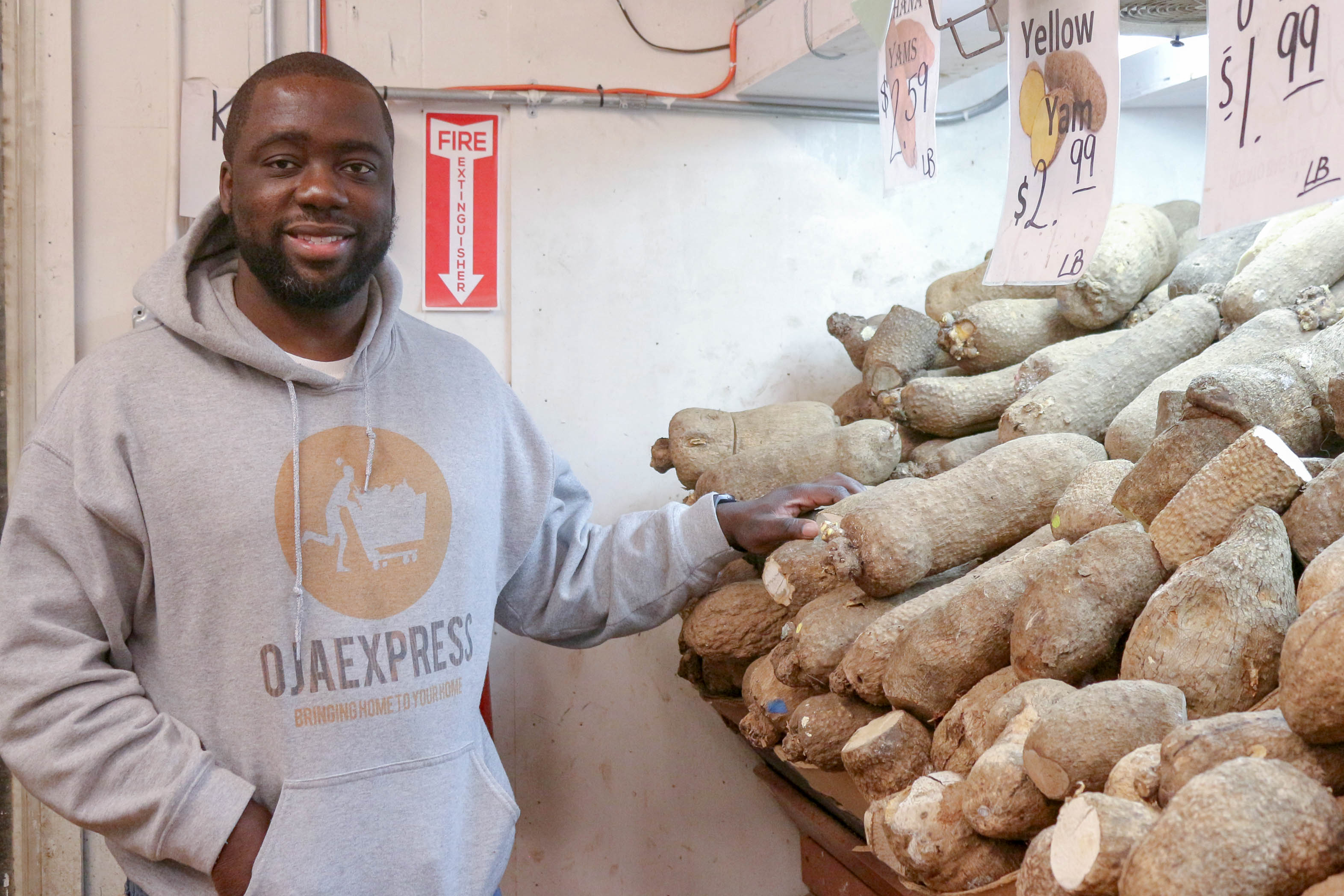
“How do you tell if your yam is good?…You check the ends, feel for any brown soft spots, and cut into the middle to make sure they aren’t spoiled,” says Boyede Sobitan as he eyes a mound of leathery Ghana yams in the back corner of La Fruteria grocery in South Chicago.
Yams aren’t cheap, and he only wants to select the best for OjaExpress, his grocery delivery app that specializes in African and Caribbean ingredients, largely sourcing from local shops like La Fruteria. It’s an endeavor Sobitan co-founded in 2015 to help African families find cherished food items like ground ogbono seeds or palm oil on the South Side.
Coming from a Nigerian immigrant family himself, Sobitan grew up frequenting the city’s multicultural groceries that allow African families to prepare traditional food like egusi stew at home. Though these stores are a “happy place” for him, he says they aren’t always accessible for busy moms or professionals who don’t have time to drive to the far north or south of the city.
With OjaExpress, Sobitan says the growing African and Caribbean population no longer has to scour the polar ends of the city for ingredients to make the dishes they love.
Order online at ojaexpress.com. (877) 472-1180. info@ojaexpress.com
Adama Ba, owner of Gorée Cuisine
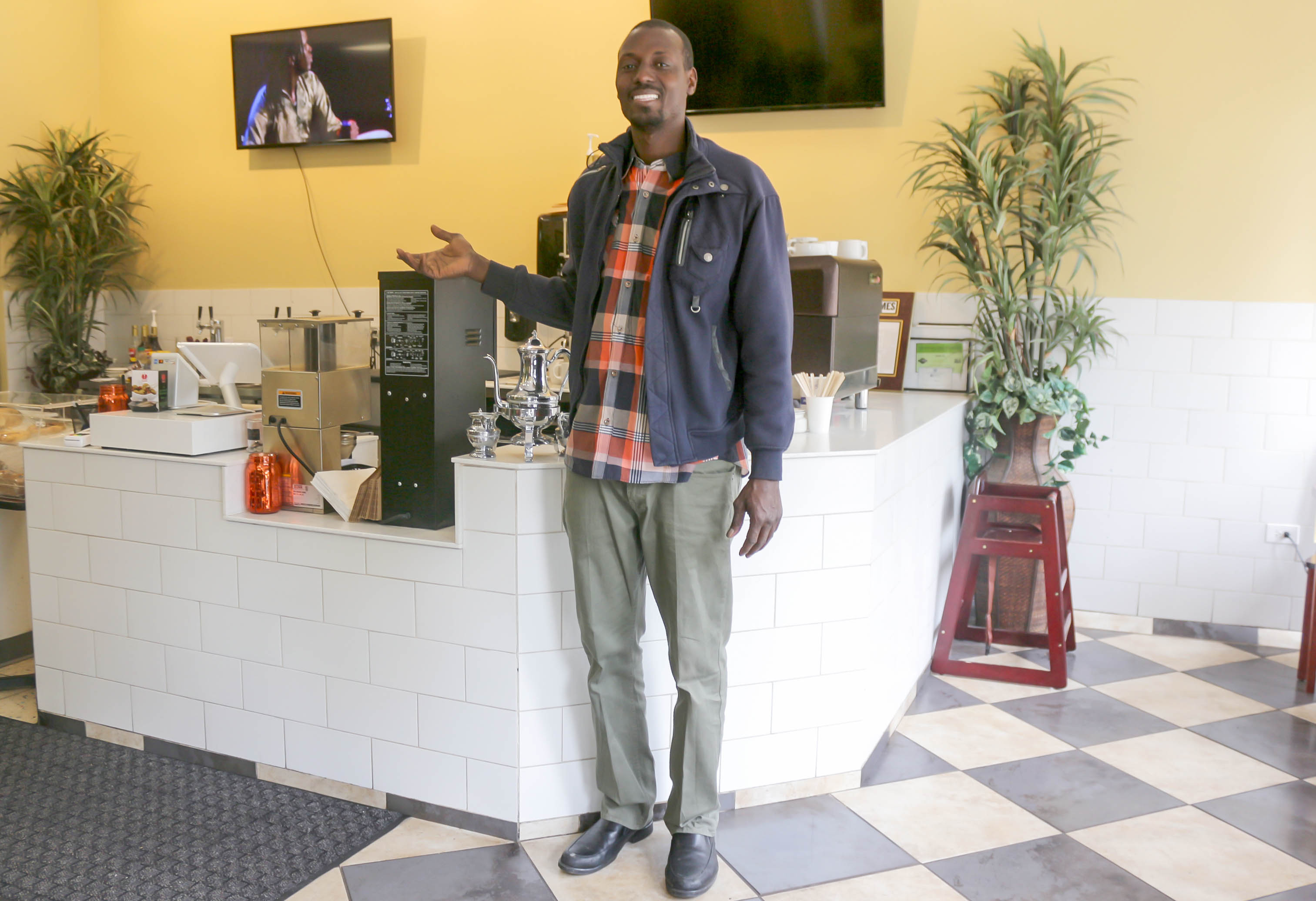
Before Adama Ba opened Gorée Cuisine, his airy restaurant with honey-colored walls in Kenwood, he already served the Senegalese community as a tailor and clothing store owner.
“Imagine fitted, elegant clothing in unique cuts with brilliant colors,” Ba says, referring to the Ankara maxi skirts and other contemporary Senegalese styles that he still sells at a storefront next to his new restaurant.
Last December, Ba opened Gorée Cuisine, serving up bold dishes like chicken yassa and tiebu djenne, the national dish of Senegal made of rice, yams, cabbage and fish. His inspiration comes from his home on Gorée, a tiny forty-five-acre island just two miles from Dakar where roughly twenty million Africans were sold into slavery. The island, now popular as a pilgrimage site for diaspora tourists, was a natural bridge to Ba’s new life in Chicago.
“When I moved to the South Side, I felt that I already had this deep connection from Gorée island,” he explains. “For me, I see the South Side as a beacon of Black culture and art, and Gorée was the last part of Africa that many African Americans experienced before the journey to the Americas.”
There’s a growing Senegalese community on the South Side, Ba says, from hair braiding shops to restaurants. With two storefronts in Kenwood, he hopes he has planted a seed for a community center. “I would love for a Little Africa to be on 47th,” Ba says. “Maybe it will happen one day.”
Gorée Cuisine, 1126 E. 47th St. Monday-Sunday, 8am-10:30pm. (773) 855-8120. goreecuisine.com
This report was produced in collaboration with City Bureau, a Chicago-based journalism lab.
Did you like this article? Support local journalism by donating to South Side Weekly today.

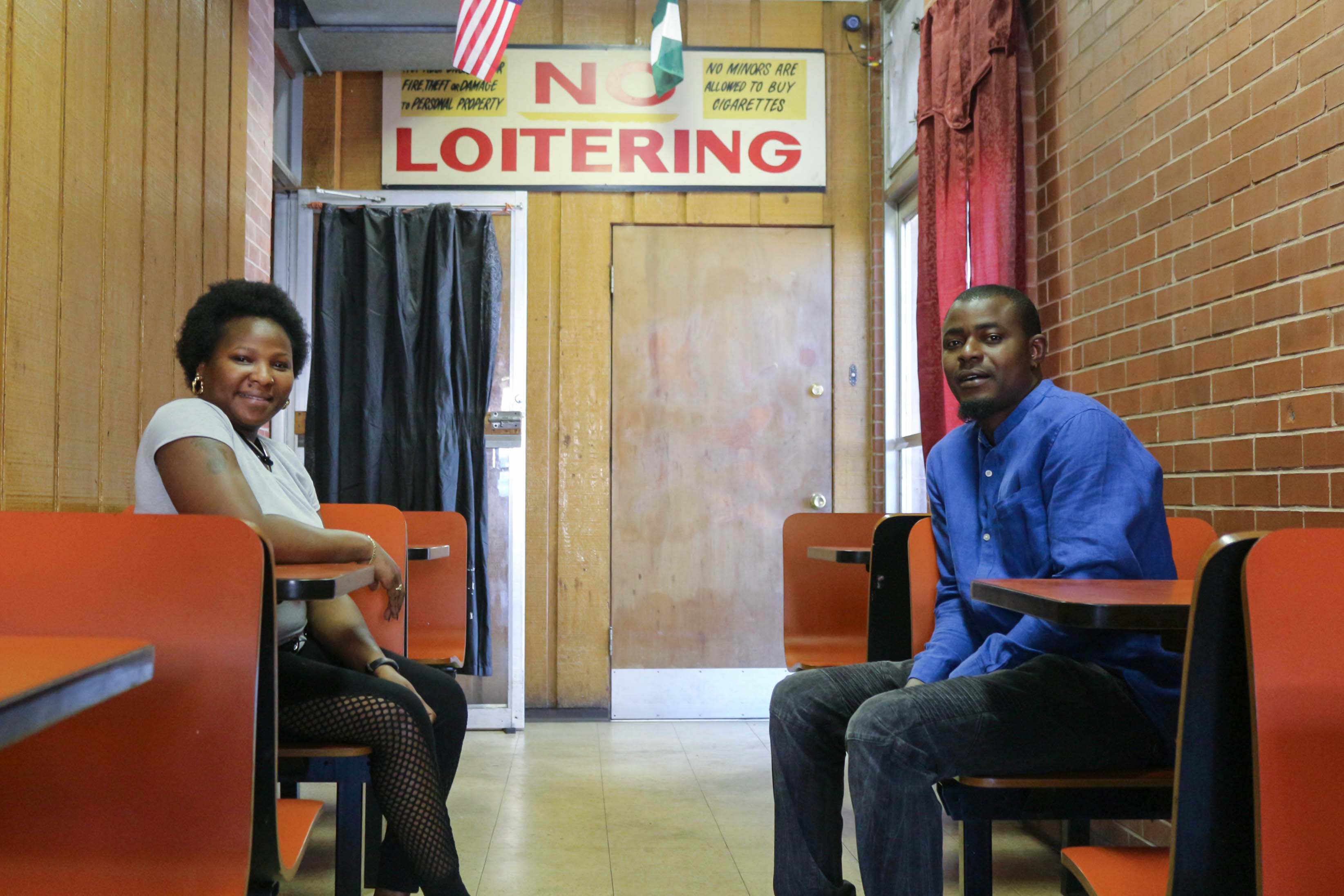
Great info in this article. Glad for this focused coverage. There’s another grocery called MANNY’s on 76th and Jeffrey. Hope you can add him. 7627 s jeffrey 773-977-8001
Iam glad that brothers and sisters from the motherland are investing in the south side with cuisines from the motherland.I have eaten at yassa s for over11 years.
It could be a good and useful piece of details. I am happy that you simply contributed this helpful information and facts around. Remember to keep us up to date such as this. Many thanks spreading مركز مصر للاشعة .
Go baby go
We need more Black American restaurants not ones from Africa.
you have a great blog and useful information for everyone to read.